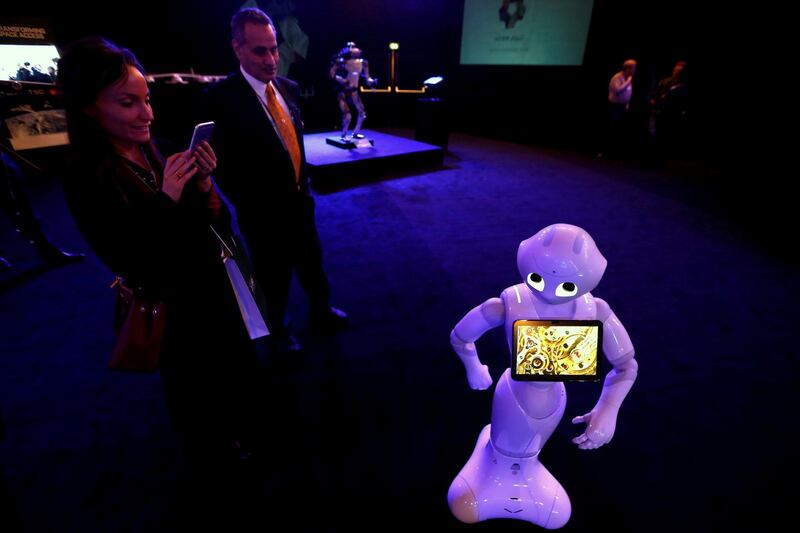"I like work: It fascinates me. I can sit and look at it for hours." The words of the English writer Jerome K Jerome have a strong humorous appeal, but they also sum up increasingly important studies of what work might mean for most of us 10, 20 or 50 years from now. Will work in the future mean a life of leisure and pleasure? Or boredom and human uselessness? In Britain a study by the think tank Future Advocacy claims one in five British jobs could be automated by 2030. Work as we know it now will be made obsolete by robots and artificial intelligence, and economies all over the world will face enormous dislocation in employment.
At a Future of Work conference in Paris, one speaker revealed that the most common job in the US in the 1960s was "secretary". He asked the largely business audience how many of those present had a secretary today, and no hands went up. Then the speaker showed a map of the United States with the most popular job nowadays identified state by state: "trucker". But for how long? Trucking companies worldwide are considering when to commit to driverless vehicles. The first company to get rid of drivers successfully will have a competitive advantage. Others will be forced to follow, or price themselves out of the market. Driverless cars, another speaker said, could Out-Uber Uber, because any driverless car owner could rent out the vehicle when not in use, putting traditional taxis, minicabs and perhaps even Uber out of business. Well, maybe.
_____________________
More from Gavin Esler
[ In the struggle against terrorism, torture is counter-productive and morally wrong ]
[ Could western democracies learn from the Chinese political model? ]
_____________________
Economists, business specialists and other big thinkers at the conference suggested two possible futures for human workers. One is Leisure Heaven, the other Workless Hell. In the first scenario, human lives will be full of leisure and fun. We will no longer be burdened with dreary repetitive work. The robots will do it, and we will enjoy life. In the second scenario, yes, the robots still take our jobs but instead of enjoying new freedoms we are left miserable, unemployable and useless. Over the next few years you are much more likely to see futuristic novels and movies about the hellish vision of our future. That’s because film-makers, novelists and (let’s be honest) journalists, know that scaring people half to death is more likely to make them watch the film, read the book or buy the newspaper. But the possibility of a better future is worth considering.
In our happy leisure-filled future, instead of humans sitting in a truck, factory or office performing routine tasks, all over the world robots will do the boring, repetitive, and dangerous stuff. You and I will be free to study, pursue hobbies, do voluntary work, go to the gym, socialise, help other people. We will live longer, healthier, better lives, and we will invent new ways to be creative and have more fun. But there is an obvious catch. How do we feed our families? How do we earn money? The thinkers at the conference suggested governments and businesses would reward more generously jobs which only humans can do. That means currently low paid jobs will be much in demand. Nurses, carers, those looking after the old or children, any profession which involves one-to-one human contact, actors, teachers, sports instructors, might actually find their pay goes up. Ah, but the miserable types argued that it will not be so pleasant. Instead we stupid humans will become increasingly irrelevant. Work will become a privilege enjoyed only by the super-rich, the people who own the companies which produce the robots. The rest of us will be kept in line with some kind of welfare, perhaps a universal wage. One suggestion that was very odd, but not impossible, is that governments would supply us all with endless, sophisticated entertainment including free video games. We would be encouraged to game our stupid lives away to keep us out of trouble.
_________________
More from Opinion
[ The march of progress in Fujairah makes me wistful for times past ]
[ Three events that illustrate how sport can change the world ]
_________________
So here's a reality check. Humankind has been written off in the past. The industrial revolution did destroy jobs, but it created many more. Some 30 years ago no-one predicted how emails, smartphones, Apple, Skype, WhatsApp, Google, Facebook, Twitter and Amazon would change not just our social lives but our work practices too. The best of humanity, as the historian Yuval Noah Harari noted in his book Sapiens, is that we survive because we communicate and therefore can co-operate. That is surely a reason not to dismiss the optimistic scenario. The Nobel laureate Niels Bohr once quipped that "prediction is very difficult, especially if it's about the future." At the Future of Work conference I wondered if a century ago, in 1917, anyone would have predicted that in our own time, 2017, my "work" would involve sitting in a conference centre in Paris, eating wonderful French food and engaging in debates with economists, business people, writers and thinkers, speculating about the next 100 years. If that's the future of work, then please, please can I have more of it?





